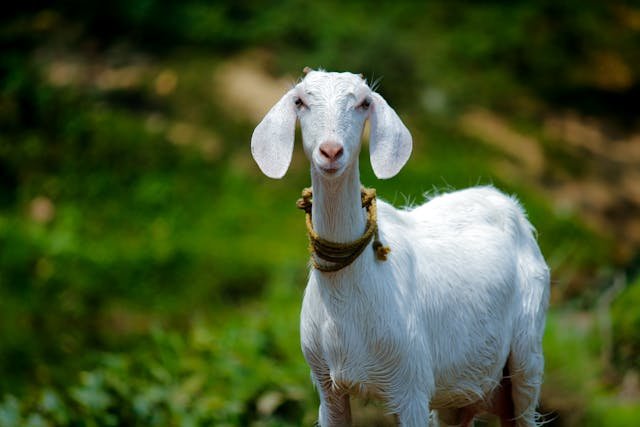Identifying goat pregnancy early is essential for proper care and management. Whether you’re raising goats for milk production, breeding, or herd growth, recognizing the signs of pregnancy ensures your goat’s health and helps you prepare for the arrival of new kids. Below, we’ll explore the key physical and behavioral changes to watch for, along with expert tips to confirm pregnancy in goats.
Quick Answer: How to Tell if a Goat Is Pregnant
Wondering how to spot pregnancy in your goat at a glance? Here are the seven clearest signs:
- Swollen belly
- Behavioral changes
- Udder development
- Reduced heat cycles
- Appetite changes
- Weight gain
- Ultrasound or veterinary confirmation
Now, let’s dig deeper to understand these signs and how to observe them effectively.

What Are the Physical Signs of Pregnancy in Goats?
Physical changes are often the first indicators that your goat might be pregnant. These signs become more noticeable as the pregnancy progresses.
1. Abdomen Enlargement
One of the most telling signs is an expanding belly. Early on, it’s subtle, but by weeks 7–12, you’ll start noticing significant abdominal growth. If you’re dealing with a twin pregnancy, this enlargement may appear more pronounced. Compare your goat to others in the herd to spot differences.
2. Udder Changes
First-time mothers, also called “first fresheners,” may show delayed udder development compared to experienced mothers. Expect udders to begin filling up closer to late pregnancy. Check for swelling, firmness, and changes in color or size as general indicators.
3. Vulva & Vaginal Discharge
You might see a slight softening or swelling of the vulva. Some pregnant goats also have minor vaginal discharge, especially in later stages. These changes are subtle, so close observation is key.
Behavioral Signs of Pregnancy
Besides physical transformations, behavioral changes offer valuable clues.
1. No Return to Heat
If your female goat (doe) doesn’t return to heat after mating, it’s a strong indication she could be pregnant. Track her heat cycles diligently for this reason. Does typically return to heat every 18–21 days if not pregnant, so the absence of these cycles is a clear sign.
2. Temperament Changes
You might notice your goat acting calmer, more withdrawn, or even slightly irritable. Pregnant does sometimes prefer solitude or show nesting behavior as their pregnancy advances. Monitoring temperament changes can reinforce other observed signs.
Dietary & Weight Changes
Pregnant goats often exhibit changes in their eating habits. An increase in appetite is common, as their bodies need more energy for fetal development. Simultaneously, they may appear sluggish or less active. Weight gain will also occur, becoming more obvious when combined with a visibly swollen belly.
Vet Confirmation Methods
While observation helps, veterinary testing provides absolute confirmation of pregnancy. Here are the most effective methods:
1. Ultrasound (Best Method)
An ultrasound can detect pregnancy as early as 30 days. It’s the gold standard for confirming pregnancy and even shows how many kids your goat is carrying.
2. Blood Test (PAG Test)
A blood test measures pregnancy-associated glycoproteins (PAGs). This method is accurate and can confirm pregnancy as early as 28 days post-conception.
3. External Palpation
Experienced breeders or veterinarians may use external palpation to feel for fetal movement in late pregnancy stages. However, this requires skill to avoid causing harm.
Goat Pregnancy Timeline
To better understand the development of pregnancy in goats, here’s a week-by-week summary:
| Week | Development Stage |
|---|---|
| 1–3 | Fertilization occurs, with no visible external changes. |
| 4–6 | Subtle behavior and no return-to-heat signs appear. |
| 7–12 | Belly begins to enlarge; behavioral signs become clearer. |
| 13+ | Significant belly growth and udder enlargement are evident. |
FAQs
Q1. How long is a goat pregnant?
A goat’s pregnancy typically lasts about 150 days (five months).
Q2. Can you use a human pregnancy test on a goat?
No, goats require veterinary-specific testing methods, such as blood tests or ultrasounds.
Q3. Do pregnant goats need special care or diet?
Yes, ensure they receive high-quality feed with added mineral supplements. Pay close attention to their nutritional needs, especially in late pregnancy.
Final Tips for Goat Owners
Caring for a pregnant goat takes planning and careful observation. Here are some final steps you should consider:
- Monitor daily for changes in behavior and physical signs.
- Keep records of breeding dates for accurate due date tracking.
- Consult a veterinarian at 30–45 days post-mating to confirm pregnancy.
Preparing for the arrival of new kids makes the experience enjoyable and stress-free. If you’re uncertain or need expert advice, reach out to your local vet or breeder for additional guidance.
By keeping a close eye on your goat and following these tips, you’ll support her through a healthy and successful pregnancy!
